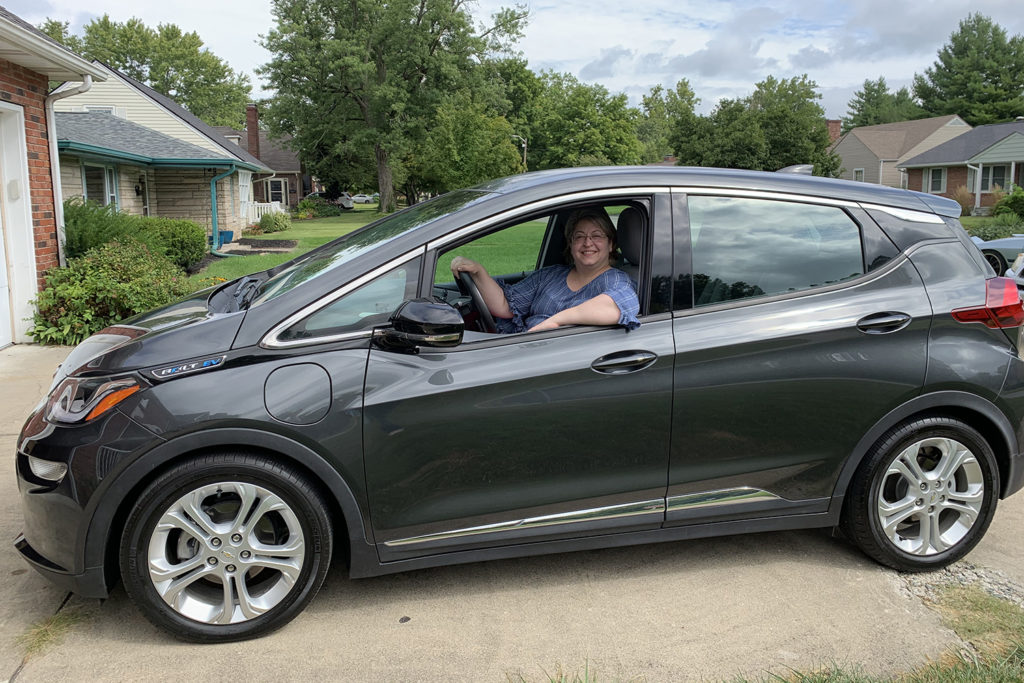
Laura Matney loved her Indianapolis co-op’s Tesla so much that she made the rounds of local car dealers this year looking for an affordable electric car for herself.
What she found instead was a frustrating lack of knowledge among car salespeople about the electric vehicles parked in their lots. They couldn’t tell her the most basic information about how far a specific EV could go on a fully charged battery or what kind of electrical outlet she would need to charge the car quickly.
“I went out for a test drive with a young dealer and I said, ‘Tell me about the range on this car,’” said Matney, marketing manager for Wabash Valley Power Alliance, a generation and transmission co-op. “He said, ‘I’m not really sure what you mean by range.’ Another dealer had no idea that cold and heat can affect the battery’s range … If I hadn’t really wanted to buy an electric vehicle, I would have given up.”
Matney’s story is not unique. NRECA’s online forum for co-op conversations about electric vehicles is filled with tales of car dealers who don’t seem to know the first thing about EVs. That’s especially disappointing for co-ops trying to encourage their members to drive EVs as a way to boost energy sales, reduce maintenance and fuel costs for consumers, and help the environment.
NRECA is looking at ways to address the problem by offering interested co-ops a fee-based service that would assess the EV expertise of the dealers in their territories.
“It’s a brand-new offering spurred in large part by the horror stories we’ve heard,” said Brian Sloboda, NRECA’s director of consumer solutions. “A lot of dealers in co-op territories don’t even have an EV on the lot. And those that do often don’t know enough to give consumers information about the financial incentives available from governments and co-ops to buy an EV.”
NRECA is working with D+R International, a Maryland-based consulting firm, to devise the most affordable way for paid contractors to interview dealers in co-op areas to find out what they know about EVs.
“A dealer assessment like this is valuable so that we as a co-op can find out what’s out there and give that information to our members who are interested,” said Eliana Martinez, energy management specialist at United Power in Brighton, Colorado.
Each dealer would be given a rating, and co-ops would use that information to post a list of the best EV dealers on their websites to help members know where to go. D+R has worked with about half of NRECA’s member co-ops to develop the ChooseEV website, which co-ops such as United Power and Wabash Valley already use to educate members about EVs.
“Co-op members could go straight to ChooseEV websites to see which dealers are ready to go,” Sloboda said.
After they get the survey results, co-ops could host an education program for local dealers that need help. The program will feature a half-hour webinar developed by D+R and NRECA, he said.
“The education program would be delivered by the co-ops so if the dealers have questions, they’ve got a local partner to help them,” Sloboda said.
One car salesman who has been enthusiastic about EVs for years is Nigel Zeid of Boulder Nissan in Colorado. Zeid, Nissan’s top-selling EV specialist in America, says too many dealers still balk at selling electric cars.
“We in the car industry are our own worst enemy as far as EVs are concerned,” Zeid said. “Dealerships in general don’t make money on selling new cars as the profit margins are much thinner than people think, so servicing and selling parts are important. A car with an internal combustion engine has about 3,000 moving parts versus 30 for an electric vehicle, so there’s no revenue stream in an EV.”
Salespeople often don’t want to take the time with a potential EV buyer to explain how the car works or to educate themselves about electric vehicles, Zeid said.
“But we can’t just blame the salesforce for the lack of EV enthusiasm,” said Zeid, who emphasized that he was offering his personal opinion and not speaking for his employer. “It starts at the top, either at the dealership management level or at the corporate level.”
Zeid said he thinks of himself as a “pollinator” spreading EV knowledge among consumers.
“I’ll talk to anyone at length about electric vehicles and, even if they don’t buy anything, they’ll talk to someone else and tell them to come see me,” he said. “That’s how I’ve developed my reputation. Plus, I love driving an EV, so it’s not hard to be genuinely enthusiastic about them.”
Meanwhile, back in Indiana, Matney gave up on her local car dealers and, armed with her own research, bought an all-electric 2017 Chevy Bolt online from Carvana.
“I know it takes time to adopt new technology, but these dealers need to understand that if you don’t keep up with the times, you get left behind,” she said.
Erin Kelly is a staff writer at NRECA.